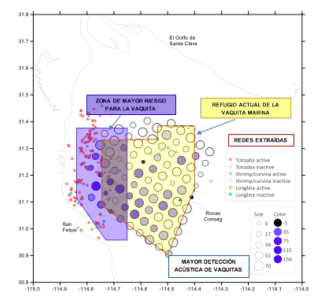Strengthened Partnership with Mexico Brings Renewed Hope for Vaquita
Published by Sea Shepherd Conservation Society
Mexican Government Enforcement Officers start joint operations on board Sea Shepherd vessels, bolstering chances for survival of endangered vaquita porpoise and addressing security concerns in the region.
SAN FELIPE, BAJA CALIFORNIA MEXICO – February 28th, 2018 –Marine conservation group Sea Shepherd marks closer ties with Mexican government by inaugurating a joint anti-poaching presence on board its vessels stationed in the Sea of Cortez.
With less than 30 vaquita marina porpoises (Phocoena sinus) remaining and a loss of over 90% of the species between 2011 and 2016, Sea Shepherd’s work removing gillnets from the porpoise’s habitat has lent a lifeline to the critically endangered marine mammal.
The main reason for this drastic decline in population is due to bycatch. The vaquita are ensnared in gillnets set to harvest another critically endangered species: the totoaba (Totoaba macdonaldi), a type of sea bass. Its swim bladder is sold on black markets in China and Hong Kong to make a soup of unproven medicinal benefits. A single totoaba swim bladder can fetch more than $20,000 USD.

The Mexican government is continuing its efforts to prevent the extinction of the vaquita porpoise, including partnering with Sea Shepherd for the past 3 years. This relationship has been fundamental for protecting the remaining vaquitas. It is bolstered by the government’s ongoing support, including placing armed Marines, Federal Police, Fisheries Officers and agents from the Federal Attorney’s Office for Environmental Protection on board the organization’s vessels.
Two Sea Shepherd vessels, M/V John Paul DeJoria and M/V Farley Mowat, now each host six Enforcement Officers onboard, with the ability to make arrests, prevent poaching in the refuge and ensure the proper disposal of dead totoaba fish.
This new facet of the government partnership comes at a time where tensions are rising in Upper Gulf of California. Poachers have become more aggressive towards Sea Shepherd vessels, using firearms to shoot down drones and incendiary objects to intimidate the crew. Thanks to the addition of armed Enforcement Agents, security has drastically improved, allowing Sea Shepherd to continue its work protecting the Vaquita Refuge.
In addition, the government has implemented recommendations using CIRVA and Sea Shepherd’s data to identify a new area of high risk for the vaquita porpoise. The Mexican secretariat for the Environment announced on February 9th a new plan to save the vaquita, including a new protected area, where efforts will be focused to remove illegal nets.
To date Sea Shepherd has removed 541 pieces of illegal fishing gear from the Sea of Cortez since starting its effort to protect the vaquita porpoise in 2015, saving 2566 animals in the process. This number does not include the countless animals saved by the removal of these illegal gillnets from their habitat.
Image Credit: Sea Shepherd/ Manuel Leyva/ Rebecca Griffiths
Read the full article at: https://seashepherd.org/2018/02/28/strengthened-partnership-with-mexico-brings-renewed-hope-for-vaquita/









